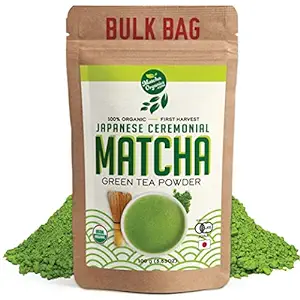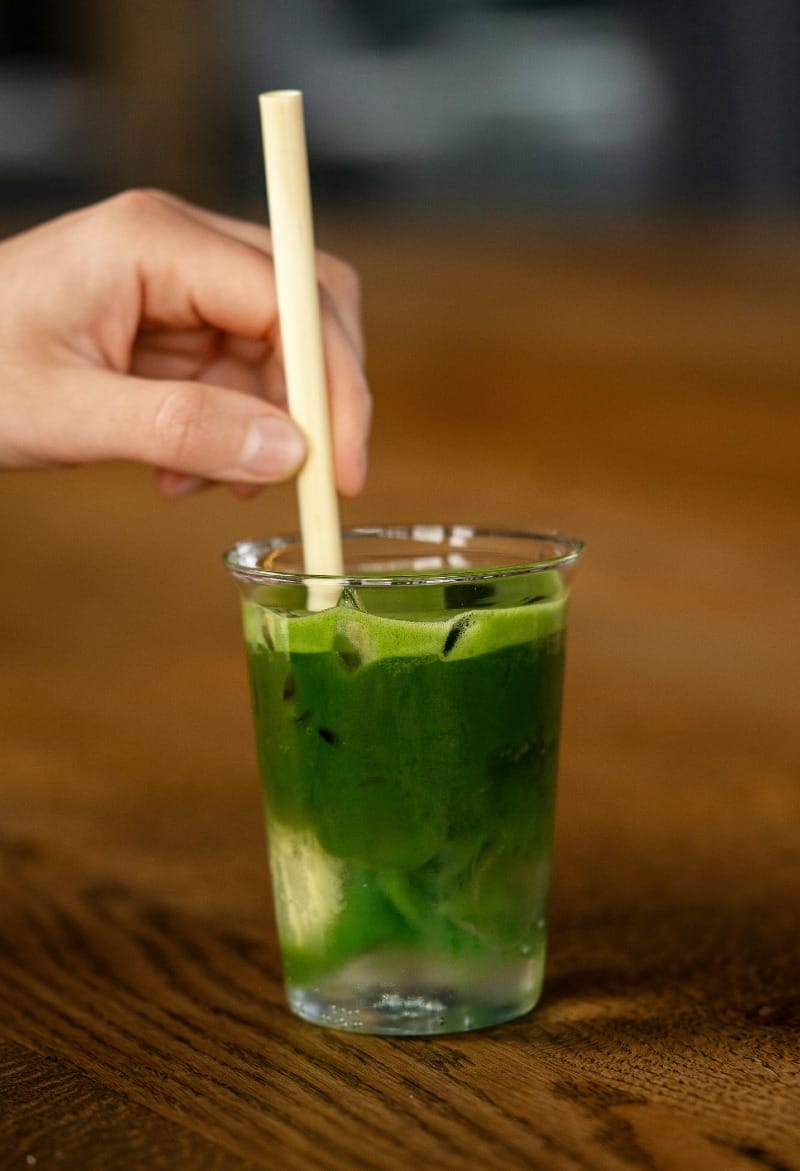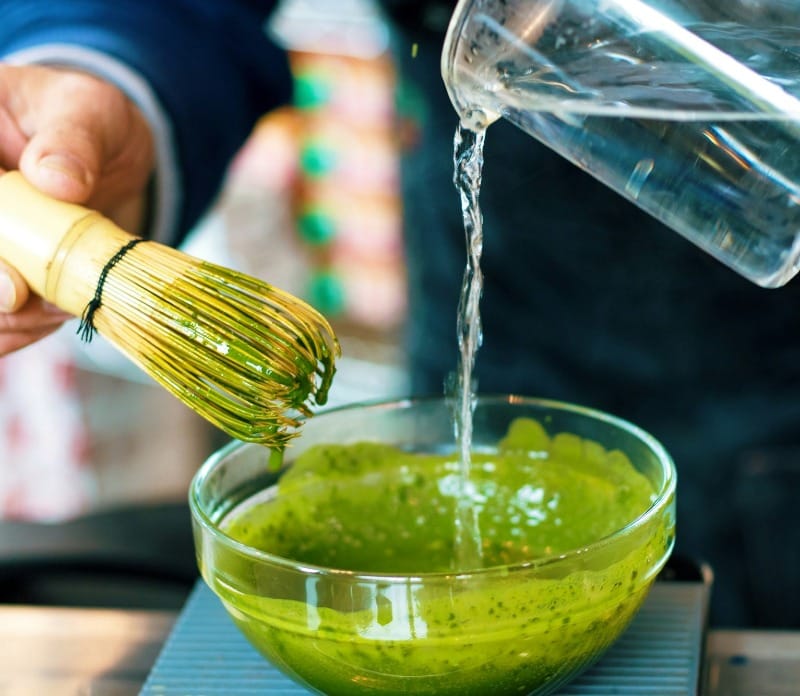Matcha, the vibrant green powdered tea from Japan, has taken the wellness world by storm. Known for its unique flavor and potential health benefits, matcha has become a popular alternative to coffee for those seeking a caffeine boost. But how much caffeine does matcha actually contain? Let's dive into the science behind matcha's caffeine content and explore its effects on our bodies and minds.

Key takeaways:
• Matcha typically contains 19-44 mg of caffeine per gram
• A standard serving of matcha (2-4 grams) provides 38-176 mg of caffeine
• Matcha's caffeine is released more slowly due to its L-theanine content
• The caffeine-L-theanine combination may offer unique cognitive benefits
Understanding matcha's caffeine content
Matcha is made from shade-grown green tea leaves that are ground into a fine powder. This unique processing method contributes to its higher caffeine content compared to regular green tea. According to research, matcha contains between 19-44 mg of caffeine per gram[1]. A typical serving of matcha, which ranges from 2-4 grams (about 1/2 to 1 teaspoon), can provide anywhere from 38-176 mg of caffeine[2].
To put this into perspective, an 8-ounce cup of coffee generally contains 95-200 mg of caffeine. While matcha's caffeine content can vary widely depending on preparation methods and serving size, it's generally comparable to or slightly lower than coffee.

The L-theanine factor: Matcha's secret weapon
What sets matcha apart from coffee is its high content of L-theanine, an amino acid known for its calming effects. L-theanine works synergistically with caffeine to produce a unique state of alert relaxation[3]. This combination can lead to improved cognitive performance without the jitters often associated with coffee consumption.
Dr. Emma Derbyshire, a nutrition and biomedical science researcher, explains: "The combination of L-theanine and caffeine in matcha can promote a state of calm alertness, potentially enhancing cognitive function without the crash often experienced with coffee."
Matcha vs. coffee: A comparison of effects
While both matcha and coffee can boost alertness and cognitive function, their effects on the body differ:
- Energy release: Matcha's caffeine is released more slowly due to its L-theanine content, providing a sustained energy boost without the rapid spike and crash associated with coffee[4].
- Cognitive benefits: The caffeine-L-theanine combination in matcha may offer unique benefits for attention, memory, and reaction time[5].
- Antioxidant content: Matcha is rich in catechins, particularly epigallocatechin gallate (EGCG), which have potent antioxidant properties[6].
- Digestive effects: Some people find matcha gentler on the stomach compared to coffee, which can increase acid production.
Factors affecting matcha's caffeine content
Several factors can influence the amount of caffeine in your matcha:
• Quality of the matcha: Higher-grade matcha tends to have more caffeine
• Preparation method: The amount of powder used and water temperature can affect caffeine extraction
• Serving size: Larger servings naturally contain more caffeine
• Growing conditions: Shade-grown matcha typically has higher caffeine content
Maximizing the benefits of matcha
To get the most out of your matcha consumption, consider these tips:
- Start with a small serving (1/2 teaspoon) and gradually increase to assess your tolerance.
- Prepare matcha with water just below boiling point (around 175°F or 80°C) for optimal flavor and nutrient extraction.
- Consume matcha earlier in the day to avoid potential sleep disruptions.
- Pair matcha with a balanced diet and regular exercise for overall health benefits.
Conclusion
Matcha offers a unique alternative to coffee for those seeking a caffeine boost. Its combination of caffeine and L-theanine provides a balanced energy lift without the jitters often associated with coffee. While matcha's caffeine content can vary, a typical serving provides a moderate amount of caffeine along with potential cognitive and health benefits.
As with any caffeinated beverage, it's essential to consume matcha in moderation and be aware of your individual tolerance. By understanding matcha's caffeine content and unique properties, you can make informed decisions about incorporating this vibrant green tea into your daily routine.
Ready to explore the world of matcha? Try incorporating it into your morning routine or as an afternoon pick-me-up. Share your experiences with matcha in the comments below, and let us know how it compares to your usual caffeine source!
References:
[1] Kochman, J., Jakubczyk, K., Antoniewicz, J., Mruk, H., & Janda, K. (2021). Health Benefits and Chemical Composition of Matcha Green Tea: A Review. Molecules, 26(1), 85. https://doi.org/10.3390/molecules26010085
[2] Weiss, D. J., & Anderton, C. R. (2003). Determination of catechins in matcha green tea by micellar electrokinetic chromatography. Journal of Chromatography A, 1011(1-2), 173-180. https://doi.org/10.1016/S0021-9673(03)01133-6
[3] Dodd, F. L., Kennedy, D. O., Riby, L. M., & Haskell-Ramsay, C. F. (2015). A double-blind, placebo-controlled study evaluating the effects of caffeine and L-theanine both alone and in combination on cerebral blood flow, cognition and mood. Psychopharmacology, 232(14), 2563-2576. https://doi.org/10.1007/s00213-015-3895-0
[4] Unno, K., Furushima, D., Hamamoto, S., Iguchi, K., Yamada, H., Morita, A., ... & Nakamura, Y. (2018). Stress-Reducing Function of Matcha Green Tea in Animal Experiments and Clinical Trials. Nutrients, 10(10), 1468. https://doi.org/10.3390/nu10101468
[5] Dietz, C., & Dekker, M. (2017). Effect of Green Tea Phytochemicals on Mood and Cognition. Current Pharmaceutical Design, 23(19), 2876-2905. https://doi.org/10.2174/1381612823666170105151800
[6] Xu, P., Ying, L., Hong, G., & Wang, Y. (2016). The effects of the aqueous extract and residue of Matcha on the antioxidant status and lipid and glucose levels in mice fed a high-fat diet. Food & Function, 7(1), 294-300. https://doi.org/10.1039/C5FO00828J
Citations:
[1] https://www.ncbi.nlm.nih.gov/pmc/articles/PMC8156288/
[2] https://www.healthline.com/nutrition/does-matcha-have-caffeine
[3] https://www.ncbi.nlm.nih.gov/pmc/articles/PMC7796401/
[4] https://www.sciencedirect.com/science/article/pii/S2665927122002180
[6] https://naokimatcha.com/blogs/articles/why-the-caffeine-content-in-matcha-beats-coffee
[7] https://www.wellandgood.com/how-much-caffeine-in-matcha/
[8] https://ujimatchatea.com/blogs/news/matcha-and-brain-health














Member discussion